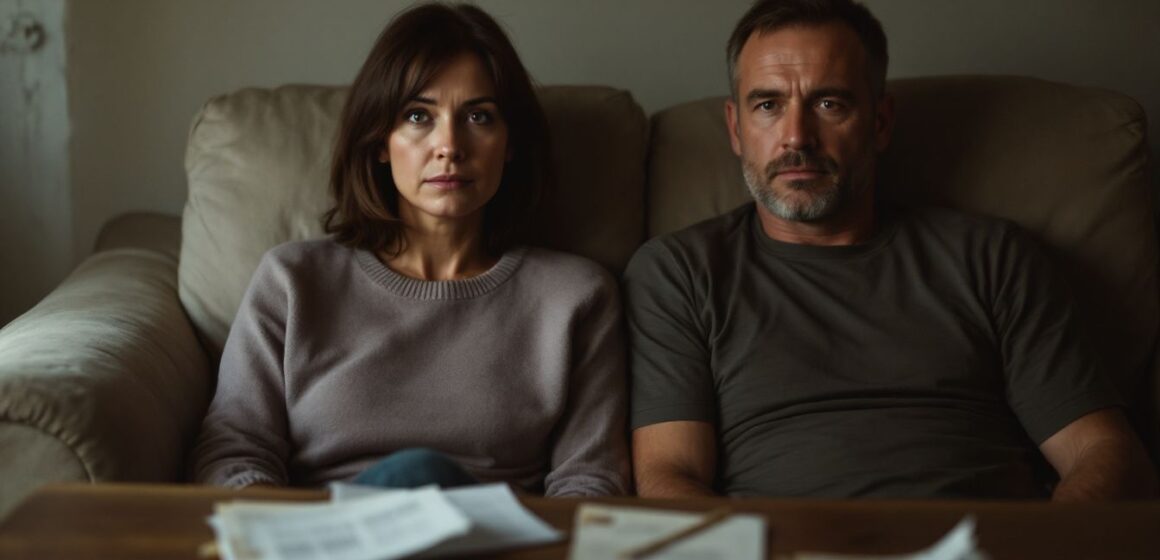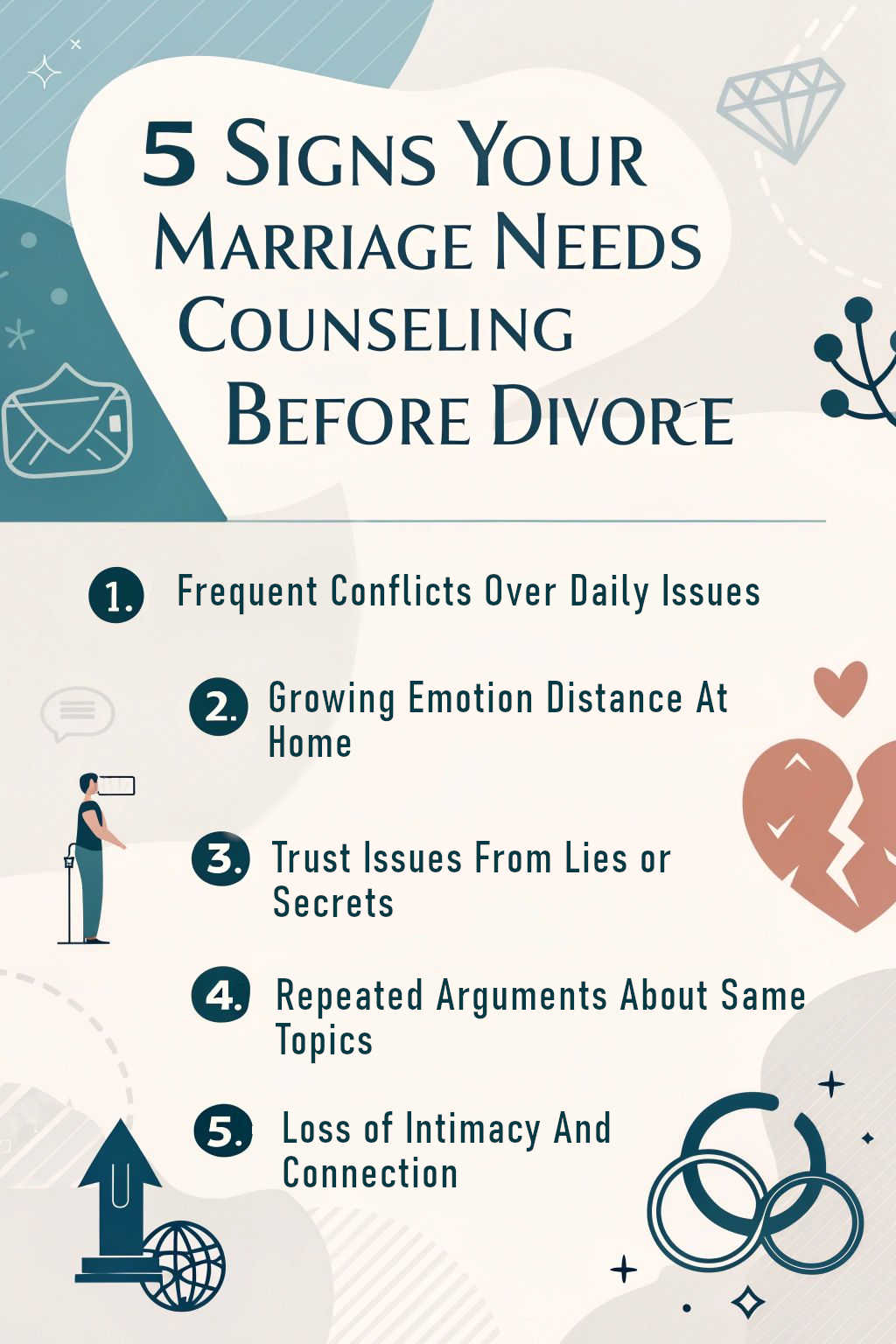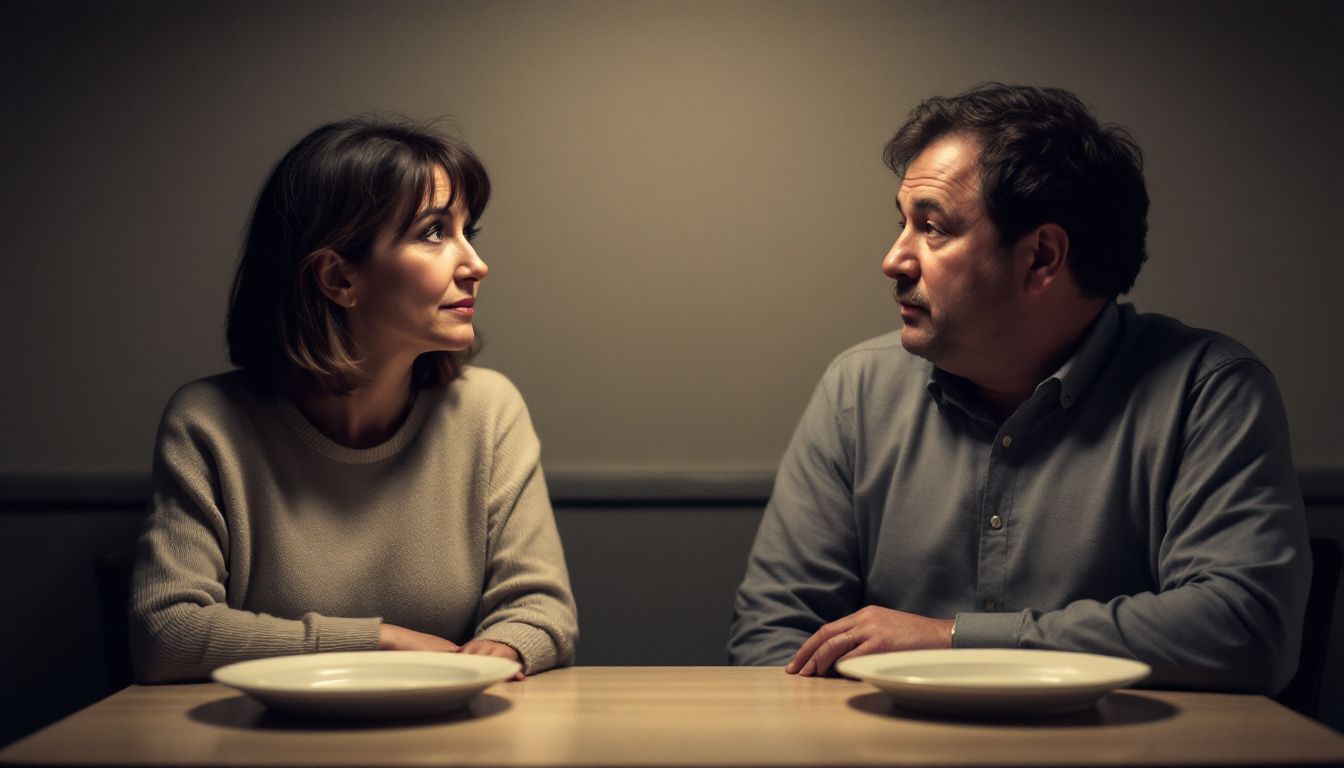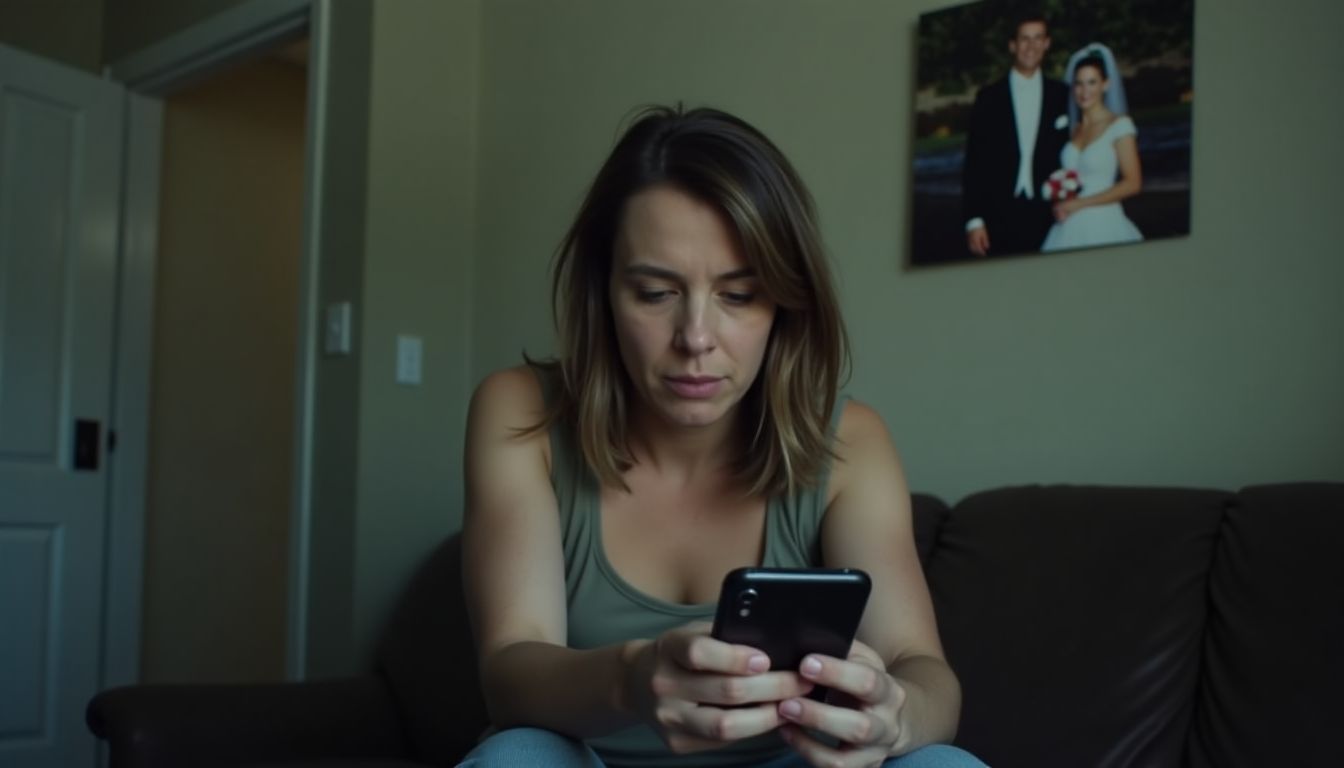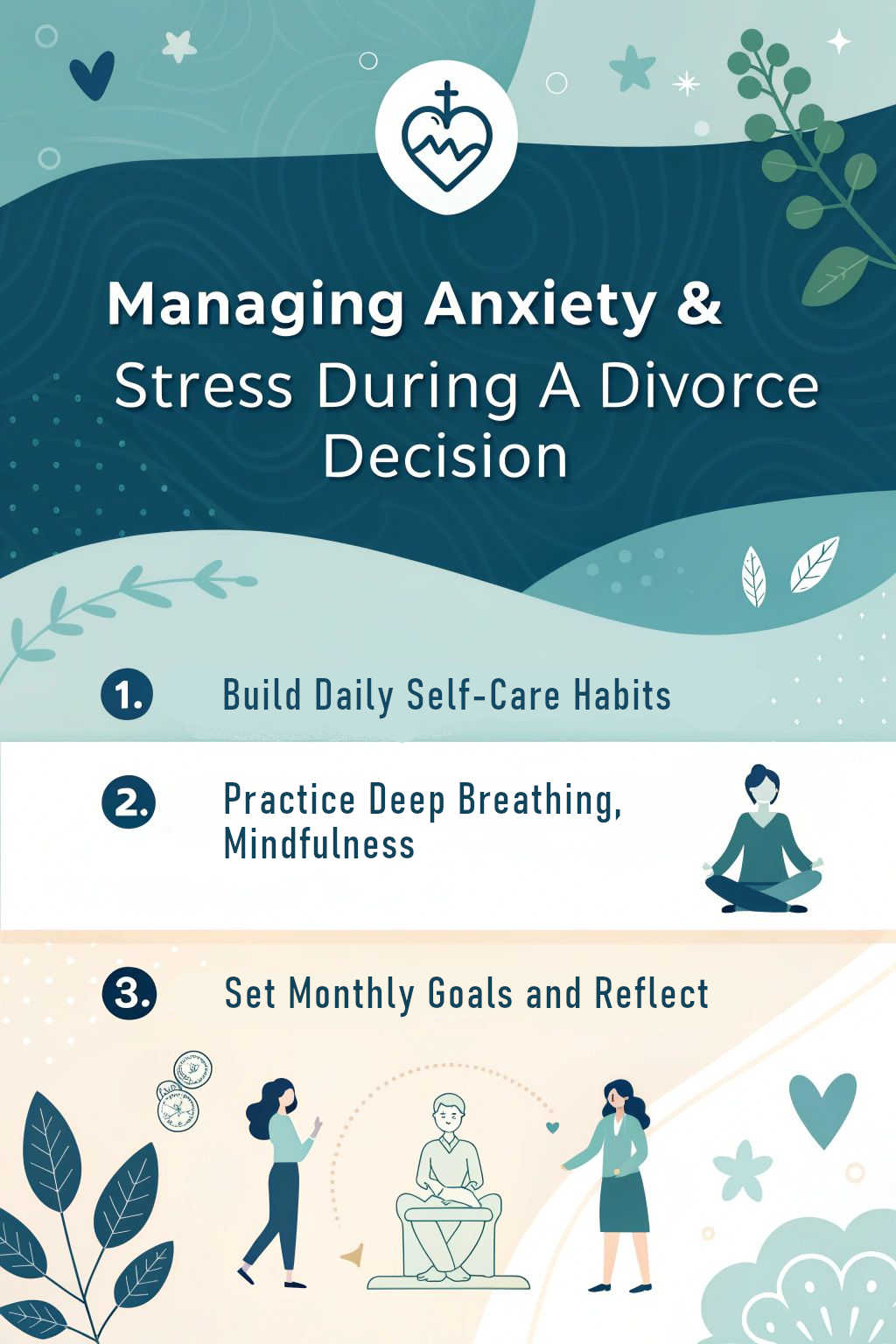How To Know If You Need Pre-Divorce Counseling
Marriage troubles can leave you stuck between staying together or splitting up. I’ve watched countless couples wrestle with this painful choice in my practice, and research shows that about 40% of marriages end in divorce.
The weight of this decision can feel crushing some days, like trying to find your way through fog. This blog will help you spot signs that pre-divorce counseling might be right for you.
Keep reading to find clarity in your relationship crossroads – sometimes the path forward becomes clearer when we have someone to guide us through the hardest conversations.
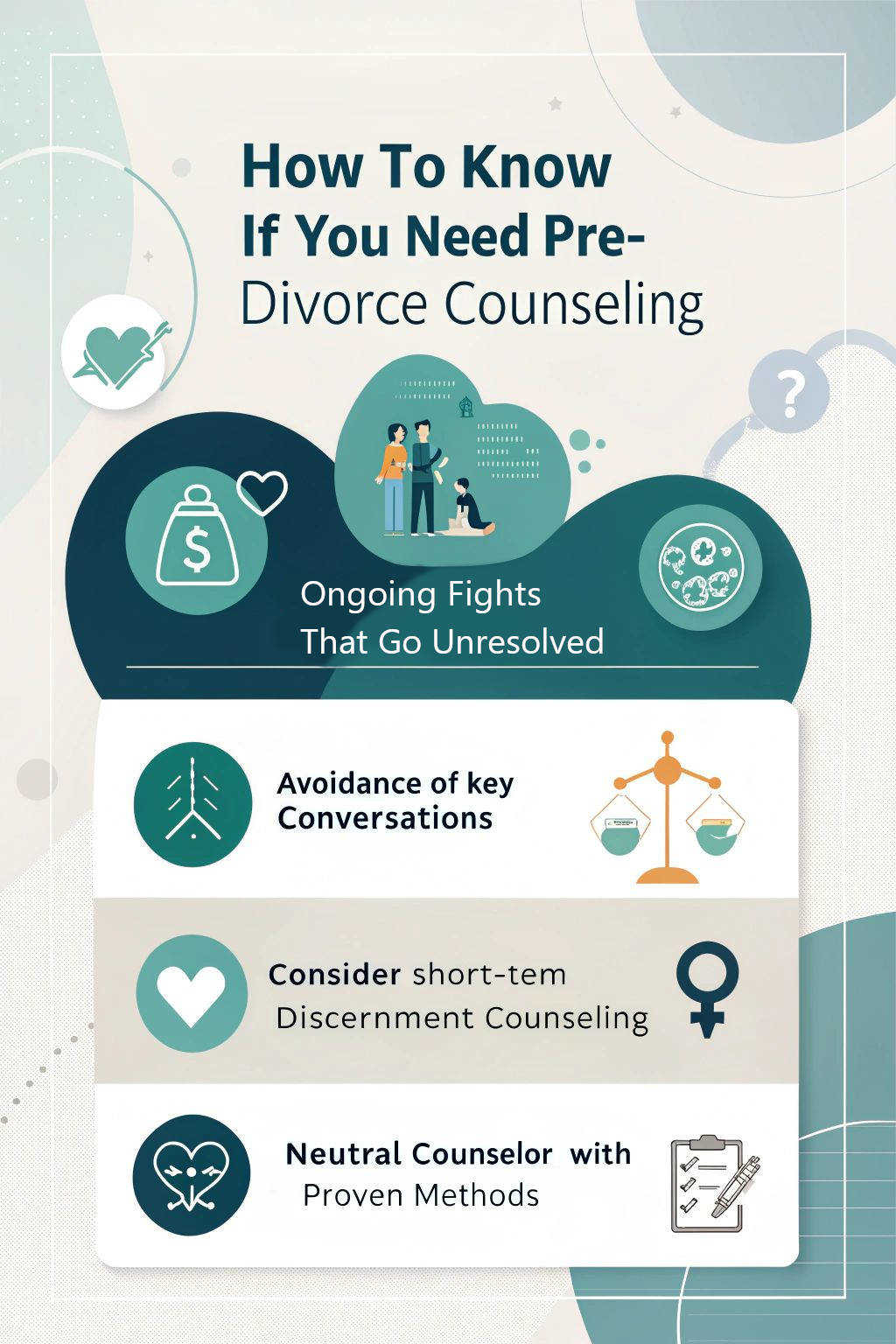
Recognizing the Need for Pre-Divorce Counseling
Marriages often hit rough patches where both partners feel stuck and unsure about the next step. You might need pre-divorce counseling if you notice certain warning signs in your relationship that point to deeper issues.
Persistent and Unresolved Conflicts
I notice couples who fight about the same issues over and over need help. These fights might be about money, chores, or how to raise kids. The pattern stays the same – you argue, maybe make up, but never fix the real problem.
My work as a therapist shows that these cycles drain your energy and hope. You both end up hurt and stuck in grief.
Fights that don’t get solved often hide deeper issues about trust or respect. If you can’t talk without yelling or one person always gives in to keep peace, that’s a red flag. Pre-divorce counseling helps break these patterns through CBT and the Gottman Method.
These tools teach new ways to handle conflict before deciding on divorce. Many of my clients find that learning these skills brings clarity – either to save their marriage or part with less anger.
Communication Breakdowns
Persistent conflicts often lead to deeper issues in relationships. Communication breakdowns happen next and create a wall between partners. My patients tell me they stop talking about important things.
They switch to short answers or stay silent for days. This pattern hurts trust and makes solving problems harder.
Communication problems show up in many ways. Partners talk over each other or don’t listen at all. They might use harsh words that cause pain. Text messages replace face-to-face talks about serious matters.
Dr. O notes that these signs point to a need for pre-divorce counseling. Couples therapy can teach new ways to express feelings without fighting. CBT helps identify thought patterns that block good talks between married couples.
Uncertainty About Separation
I often see couples who sit across from me with doubt in their eyes. They feel stuck between staying married or filing for divorce. This limbo creates mental distress and emotional instability.
One partner might want to leave while the other hopes to save the marriage. Or both might feel confused about what they truly want.
Pre-divorce counseling helps clear this fog of indecision. Through guided talks, couples gain clarity on their true feelings. My clients tell me they find relief in having a safe space to voice their thoughts without judgment.
The process doesn’t push them toward divorce or staying together – it simply helps them understand their own hearts better. This knowledge proves vital whether they choose to work on their marriage or part ways with less regret.
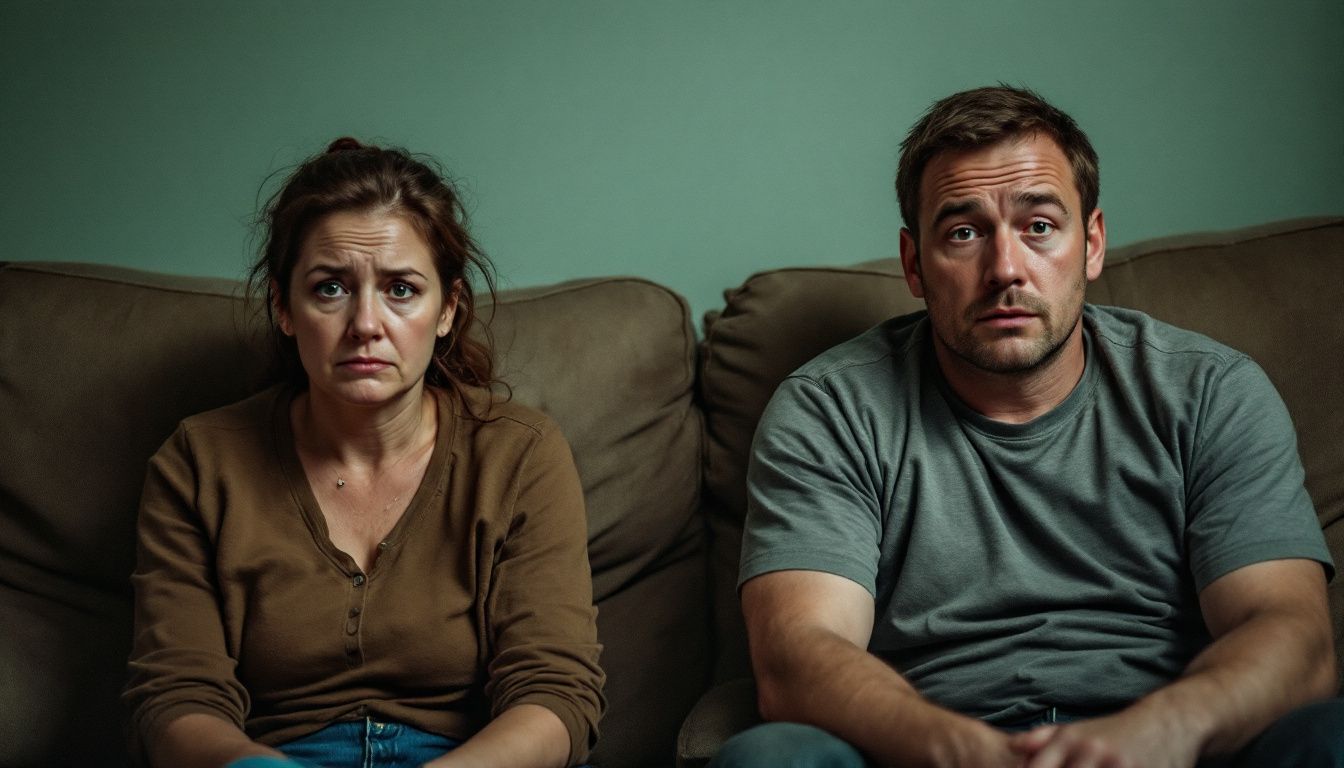
Exploring Pre-Divorce Counseling
Pre-divorce counseling gave me a safe space to sort through my feelings about my marriage. My counselor helped me talk about issues that seemed too hard to face alone. This type of therapy focuses on clear goals – either working toward healing the relationship or moving toward separation with less pain.
The sessions might include learning better ways to talk to each other, dealing with anger, or planning what comes next if divorce happens.
Marriage counselors use different methods in pre-divorce work. Some use cognitive-behavioral therapy to change harmful thought patterns that cause fights. Others focus on building empathy between partners who have lost their connection.
During my sessions, we worked on coping strategies for anxiety and sadness that came with thinking about ending my marriage. The counselor never pushed me toward staying or leaving – instead, they helped me gain self-confidence to make the right choice for my mental well-being. Counseling

Advantages of Engaging in Pre-Divorce
Pre-divorce counseling offers many benefits like helping you decide if divorce is right for you, teaching better ways to talk with your spouse, and making the split less painful if you choose to end things – I’ll show you why this step matters in my next post.
Achieving Clarity in Relationships
I’ve seen many couples stuck in a fog of doubt about their marriage. Pre-divorce counseling helped me gain clarity on my own relationship issues. Through guided talks with a therapist, I sorted through mixed feelings about my marriage.
This process isn’t about forcing a decision – it’s about seeing the truth of your situation. Couples often discover hidden patterns that cause fights or distance. A good counselor creates a safe space where both people can speak honestly about their needs and hurts.
The clarity gained through counseling serves as a solid base for whatever comes next. Some of my clients find renewed hope for their marriage after seeing things clearly. Others realize separation is truly the best path forward.
Either way, they move ahead with more peace and less guilt. This emotional clarity reduces the trauma for everyone involved, including children. The next step after gaining clarity often involves improving how you talk to each other.
Enhancing Communication Skills
Clear relationships lead to better talks between partners. Pre-divorce counseling teaches us how to speak and listen in new ways. My clients often learn to express needs without blame or anger.
This skill helps during tough choices about marriage.
Communication training breaks old patterns that cause fights. Partners learn to pause before reacting and use “I” statements instead of pointing fingers. These methods from cognitive therapy reduce misunderstandings.
Couples gain tools to discuss hard topics like money, intimacy, or past traumas without shutting down. Better talking skills help whether you stay married or part ways.

Opting for Discernment Counseling
I’ve found discernment counseling works well for couples who aren’t sure about divorce. This short-term therapy focuses on making a clear choice about your marriage – not fixing all issues.
The goal is to pick one of three paths: stay as is, move toward divorce, or try six months of therapy. Unlike regular marriage counseling, discernment sessions help you understand what went wrong without pressure to save the relationship.
My clients often feel relief after these sessions because they gain clarity about their feelings and options. The process respects both partners’ views, even when one person leans toward ending things while the other wants to stay.
Discernment counseling limits sessions to five meetings max. This structure prevents endless talks that lead nowhere and helps couples make real decisions. The counselor works with you as a couple and also meets with each person alone.
This format lets me hear private thoughts that might not come out in joint talks. Many people find their mood and mental health improve during this process – even those dealing with infidelity or deep resentment.
The key benefit is gaining self-esteem through making a choice based on facts rather than fear or anger.
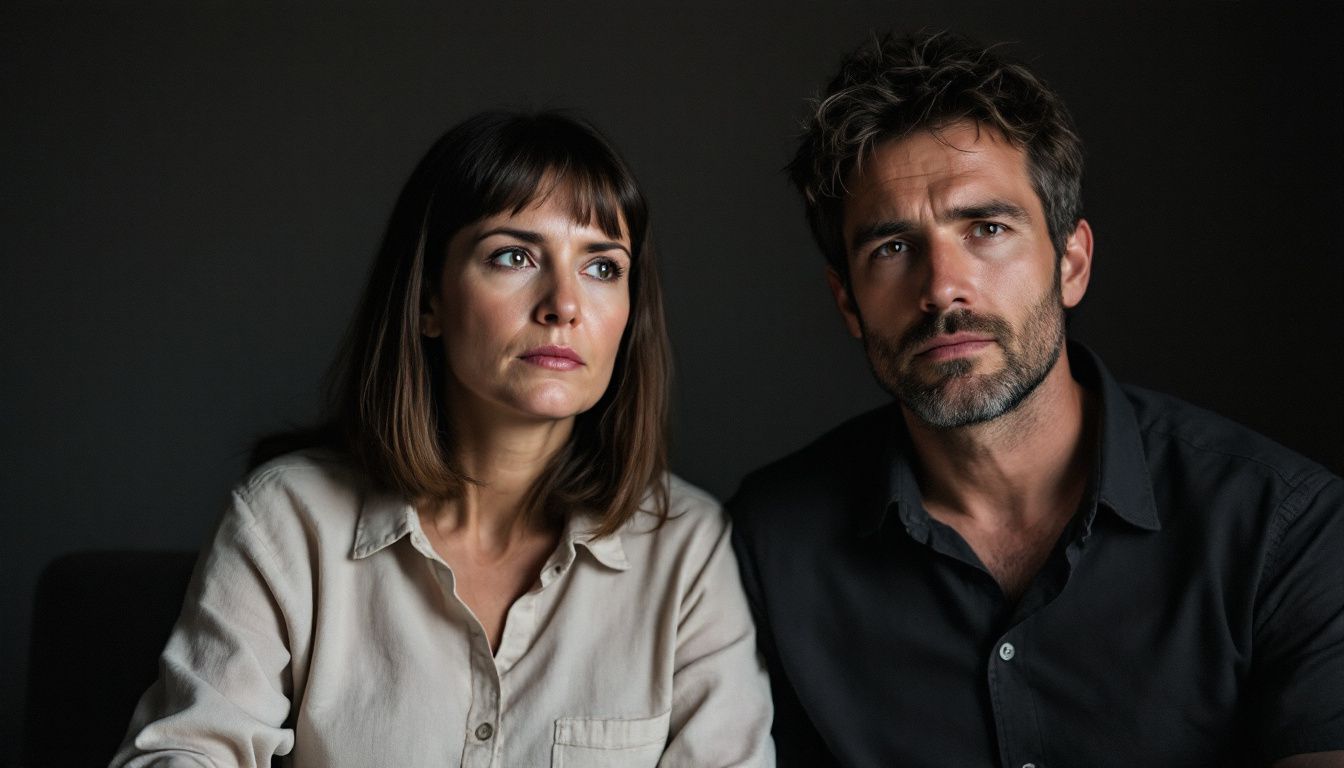
Selecting the Appropriate Pre-Divorce Counselor
Finding the right pre-divorce counselor takes time and research. My search for a good counselor taught me that not all therapists have the same skills.
- Check for proper training in marriage therapy or family counseling – A counselor with the right training will help you work through complex feelings like worry and despair.
- Look for someone who stays neutral and doesn’t take sides – This fair approach helps both partners feel heard during tough talks about the relationship.
- Ask about their success rate with couples facing divorce – Past results can show if they have helped other couples find clarity.
- Make sure they use proven methods like cognitive-behavioral therapy (CBT) – These tools help deal with depression and anxieties that often come with breakups.
- Find a counselor who respects your beliefs about marriage – Your values matter when working through issues of forgiveness and possible reconciliation.
- Talk to the counselor first before making a choice – A short chat helps you feel if this person understands your needs for couple therapy.
- Consider their fees and if your insurance covers the sessions – Money stress should not add to your current troubles.
- Ask how they handle high-conflict cases – Good counselors have plans for helping couples who struggle with tough emotions.
- Check if they offer both joint and solo sessions – Some issues need private talks to build trust and work on personal growth.
- Trust your gut feeling about the counselor – The right match feels safe for sharing your fears about loneliness and change.

Conclusion
Pre-divorce counseling offers a path to clarity during tough times. I’ve seen many couples gain vital skills through this process, whether they stay together or part ways. Your mental health matters, and getting help isn’t a sign of failure – it’s a mark of resilience.
A good therapist creates a safe space for honest talks about your relationship’s future. Know that whatever choice you make, the goal is peace with yourself and a healthier path forward.
FAQs
1. What is pre-divorce counseling?
Pre-divorce counseling is a type of relationship counseling that helps couples who are thinking about getting divorced. A marriage and family therapist works with you to explore your feelings and options before making final decisions.
2. How do I know if I need pre-divorce counseling?
You might need pre-divorce counseling if you feel stuck in constant fights, can’t talk without yelling, or wonder if your marriage can be saved. Couples therapists can help you gain clarity about your relationship and teach better ways to handle problems.
3. Can pre-divorce counseling prevent divorces?
Sometimes marital therapy can help couples fix their issues and stay together. Other times, it helps them split up with less pain. The real value is having a safe place to talk about the reasons for your troubles.
4. What happens during pre-divorce counseling sessions?
During sessions, a counseling psychology expert will help you talk about your feelings, explore what went wrong, and work on taking care of yourself. They might suggest alternative therapies or ways to build resilience as you face this hard time.
5. Is pre-divorce counseling helpful if I’m already sure about divorcing?
Yes. Even if you’re certain about getting divorced, counseling helps with grieving the relationship and finding your identity again. It’s especially important if you feel deeply sad or have had suicidal thoughts during this process.
Text content
Text content
